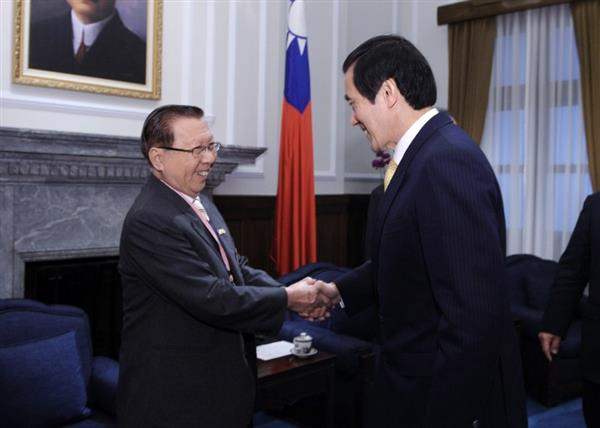News & activities
 News releases
News releases
President Ma Ying-jeou met on the morning of March 3 with a delegation of officers from the Filipino Chinese Cultural and Economic Association. He welcomed the group to Taiwan and expressed appreciation for their support for the ROC.
The president remarked that overseas compatriots have long played an important role in the history of the ROC, and ties between overseas compatriots in the Philippines and Taiwan, in particular, are quite close. President Ma said that in 1949 when the ROC government relocated to Taiwan, overseas compatriots from the Philippines were the first to come to Taiwan to show support for the troops. Meanwhile, two years ago when parts of southern and eastern Taiwan suffered devastating landslides and floods caused by Typhoon Morakot, overseas compatriots from the Philippines provided considerable assistance, he said.
President Ma stated that over the past two-plus years, the government has strived to improve the international environment for Taiwan. In addition to improving relations with the United States, Japan, and ASEAN, Taiwan has also strengthened its ties with mainland China, which has helped to gradually reduce tension in the Taiwan Strait. The government, he noted, relocated to Taiwan in 1949 and the Korea War erupted the following year. Sixty years later, incipient signs of peace have emerged in the Taiwan Strait, which contrasts with the situation on the Korean Peninsula. Taiwan and mainland China have signed 15 agreements, and 370 flights operate between the two sides weekly. People make frequent cross-strait visits, and cross-strait economic and trade relations are being put on a systematic footing, which helps Taiwan avoid marginalization and hastens its internationalization. Moreover, it reintegrates Taiwan into the world economy, affording opportunities for further talks with other nations on economic and trade ties. Meanwhile, the president said that the Cabinet-level Overseas Compatriot Affairs Commission is also seeking to shelve political divisions within overseas Chinese communities, thus promoting harmony in ethnic Chinese communities around the world.
President Ma mentioned the move by the UK in January of 2009 to include Taiwan nationals in its visa-waiver program, saying that this led to a 150% increase in Taiwanese visitors to the UK last year, while bilateral trade also grew 25%. The president commented that the economic benefits of the move are thus significant, and noted that 97 nations and areas throughout the world now grant Taiwan nationals visa-free entry. He remarked that he is confident that the total number of places providing visa-free courtesies will surpass 100 this year, the nation's centenary, and therefore considerable room exists to strengthen relations between Taiwan and the Philippines.
President Ma said that the ROC Constitution requires that protecting the rights and interests of overseas compatriots be an important focus of diplomatic work. The government, he explained, understands the hard work and achievements of overseas compatriots in their respective communities and hopes they will continue to support the ROC government and work to further the interests of the nation and the Chinese people.
The delegation, led by Mr. Cai Zi-ran (蔡自然), was accompanied to the Presidential Office in the morning by Overseas Compatriot Affairs Commission Minister Wu Ying-yih to meet President Ma.



